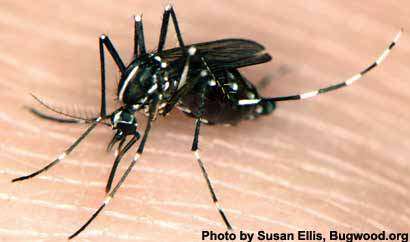Researchers compare 'natural' mosquito repellents to DEET

Every summer while preparing for long weekends at our family cabin in the north woods of Minnesota, we'd face the same dilemmas. What food should we bring? Is SPF 50 sunscreen enough protection? And, most importantly, which mosquito repellent should we buy? If we picked the wrong kind, we'd be opening ourselves up to evenings of constant swatting by the campfire and nights of uncontrollable itching. Protection from the unofficial state bird, the mosquito, was not something to take lightly.
However, while itchy limbs might be annoying, Minnesotans don't have much to worry about from mosquitoes, except for the occasional case of West Nile virus or a few other less common diseases. In other parts of the country and the world, more devastating mosquito-borne diseases such as malaria, dengue fever, and chikungunya are present, so protection from mosquitoes can be a matter of life and death. In these places, making the right decision on a mosquito repellent carries more weight than it does in Minnesota.
To help consumers decide which mosquito repellent they should buy, researchers at New Mexico State University tested 10 commercially available products for their effectiveness at repelling mosquitoes, and the results were published in the Journal of Insect Science. Three of the products (Repel 100 Insect Repellent, OFF Deep Woods Insect Repellent VIII, and Cutter Skinsations Insect Repellent) were mosquito repellents that contained DEET as the active ingredient, and four of the products (Cutter Natural Insect Repellent, EcoSmart Organic Insect Repellent, Cutter Lemon Eucalyptus Insect Repellent, and Avon Skin So Soft Bug Guard) were mosquito repellents that did not contain DEET. The other three products tested were Avon Skin So Soft Bath Oil, Victoria's Secret Bombshell perfume, and Mosquito Skin Patch, a skin patch with vitamin B1 as the active ingredient.
The products were tested against two mosquito species, the yellow fever mosquito (Aedes aegypti) and the Asian tiger mosquito (Aedes albopictus), both known vectors of dengue fever, chikungunya, yellow fever, and other diseases.
For both species, the researchers found that mosquitoes were strongly repelled by all products containing DEET. For the other products, they found mixed results.
On Aedes aegypti, the mosquito repellents that did not contain DEET either didn't repel them at all or didn't have a repellent effect after just 30 minutes. The exception was Cutter Lemon Eucalyptus Insect Repellent, which had strong repellent effects for the duration of the 240 minute test. The bath oil and perfume effectively repelled mosquitoes for 120 minutes, but the skin patch did not seem to have any repellent effect at any time.
On Aedes albopictus, two of the non-DEET repellents significantly repelled mosquitoes throughout the duration of the study. Furthermore, unlike the resuts for Aedes aegypti, Avon Skin So Soft Bug Guard had significant repellent effects for 120 minutes. The bath oil and skin patch had no repellent effects on Aedes albopictus, but the perfume repelled mosquitoes for 120 minutes, as it did for Aedes aegypti.
"The results of this study show that not all commercially available mosquito repellents are effective in repelling mosquitoes and that efficacy is also dependent on the species of mosquito that is repelled," the authors wrote. "Overall, the results from this study confirm that DEET repellents are the most effective mosquito repellents in the market. Although, based on the results from this study, a lemon-eucalyptus oil containing p-menthane-3,8-diol (PMD) [the active ingredient in Cutter Lemon Eucalyptus Insect Repellent] has similar efficacy to DEET repellents."
Perhaps the most surprising result in the study was the effectiveness of Victoria's Secret Bombshell perfume at repelling mosquitoes.
"Our results challenge the notion that floral perfume-scented sprays, in general, attract mosquitoes," the authors wrote. "Floral fragrances may provide a masking odor resulting in low mosquito attraction rates, but over a shorter duration of time."
However, the authors do provide a caveat to this finding, noting that "the concentration of perfume we used in this test was rather high and that lower concentrations of the same fragrance might have different effects."
More information: Stacy D. Rodriguez et al. The Efficacy of Some Commercially Available Insect Repellents for (Diptera: Culicidae) and (Diptera: Culicidae) , Journal of Insect Science (2015). DOI: 10.1093/jisesa/iev125
Provided by Entomological Society of America


















